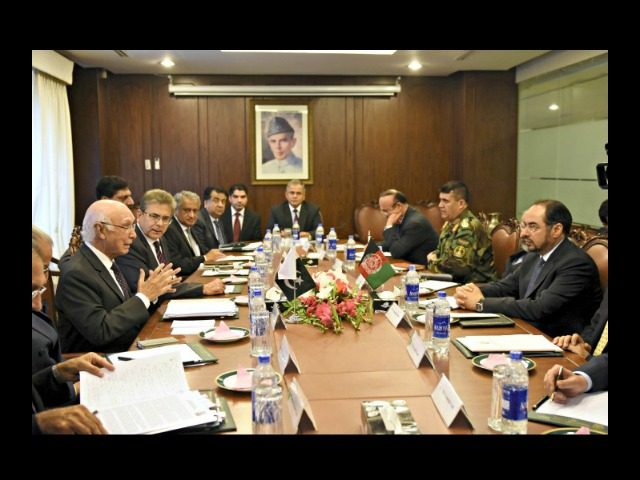The Afghan Taliban says it has sent a “high-level” delegation to Pakistan, a spokesman for the jihadist group has confirmed to Voice of America (VOA).
VOA learned from Mohammad Naeem, a spokesman based in the Taliban’s political office in Qatar, that the terrorist group hopes the visit to Islamabad will have “fruitful results” and be “in the interest of both countries.”
The spokesman noted that the Taliban delegation traveled from Qatar to hold the discussions in the light of “close relations, long border and commercial transactions” between Afghanistan and Pakistan.
Unnamed diplomatic sources told VOA that the delegation is expected to engage in “exploratory discussions” with Pakistani officials as part of Islamabad’s efforts to facilitate peace negotiations between the Taliban and the Afghan government.
They reportedly arrived in Pakistan on Tuesday.
VOA notes that Pakistan has not yet commented on the Taliban’s visit to Islamabad.
The VOA report comes after Afghan President Ashraf Ghani demanded Monday that Pakistan take military action against Taliban leaders operating from within its borders to wage jihad in neighboring Afghanistan.
“I want to make it clear that we do not expect Pakistan to bring the Taliban to [peace] talks,” Mr. Ghani told Afghan lawmakers on Monday. “If we do not see a change, despite our hopes and efforts for regional cooperation, we will be forced to turn to the å Security Council and launch serious diplomatic efforts.”
Ghani reportedly added that rather than holding peace negotiations, the Afghan security forces would fight the Taliban and other terrorist groups directly.
The Afghan president delivered those remarks nearly a week after a Taliban-linked attack in Kabul, one of the deadliest in the Afghan capital in recent years, killed at least 64 people and wounded nearly 350 others.
Taliban spokesman Naeem told VOA, “The esteemed leader of Islamic Emirate [the Taliban] has instructed the delegation to discuss issues regarding Afghan refugees, some recent problems related to [Afghan] border provinces of Helmand, Nangarhar and Paktia.”
“The delegation, which is gone [to Pakistan] from here [Qatar], is holding talks on the issues that I have stated above and has no other particular item on the agenda,” added the spokesman when VOA asked whether peace talks with the Afghan government would be part of the agenda.
VOA notes that the Taliban’s Qatar-based political office is solely authorized to engage in political negotiations.
Pakistani border authorities have been accused in various Afghan media reports of attempting to establish outposts inside Afghan territory in the border provinces of Helmand, Nangarhar, and Paktia. Islamabad reportedly denies the charges.
Naeem noted that the Taliban was expected to discuss with Pakistan the release of Mullah Bradar, a former deputy chief of the Taliban leader, and other prisoners.
In 2010, Bradar was apprehended by Pakistani intelligence officials, backed by American counterparts, in the southern city of Karachi.
“In 2013, Pakistan, at the request of the then Afghan government, freed Bradar along with dozens of other Taliban officials from its custody to boost Kabul’s efforts to promote the Afghan peace and reconciliation process at the time,” reports VOA.
“But insurgent sources insisted Bradar remains in Pakistan and local authorities have placed restrictions on his movement because Pakistani authorities would need U.S. consent to set him free,” it adds.
Mawlavi Abdul Khabeer, deputy leader of Afghanistan’s High Peace Council, says the Afghan government is not aware of the Taliban’s visit to Pakistan.
The council is charged with promoting peace and reconciliation between the Afghan government and armed opposition.
U.S. and Afghan officials have accused Pakistan of providing sanctuary to Taliban fighters waging a violent insurgency in Afghanistan. Pakistan denies the allegations.

COMMENTS
Please let us know if you're having issues with commenting.